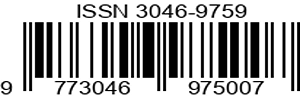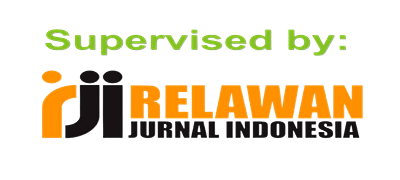THE EFFECTS OF USING PODCASTS IN THE TEACHING OF LISTENING ON STUDENTS’ LISTENING COMPREHENSION ACHIEVEMENT
DOI:
https://doi.org/10.62734/jetling.v4i1.258Keywords:
podcasts, listening comprehensionAbstract
The use of podcast in the world of education has been going on for a while, but some experts still have different opinions about the benefits of it for the education itself. The aim of this research was to investigate whether or not students who were taught listening by using podcasts get higher score on their listening comprehension test compare to other students who were taught listening by using non-podcasts materials. This study was a quasi-experimental post-test only design which employed eleventh graders majoring mathematics and natural sciences 1 as the control group and eleventh graders of mathematics and natural sciences 2 as the experimental group. The research itself lasted for 5 meetings, 4 meetings were used as teaching and learning process and 1 meeting for post-test. The data of this study were collected by using multiple choice listening comprehension test. The data that were obtained were then analyzed by using independent sample t-test and calculated through the use of SPSS 16 with 5% (0.05) significant level. Based on the result of the data analysis, there is no significant effect on using podcasts in the teaching of listening on students’ listening comprehension achievement. In summary, it can be concluded that students who were taught listening by using podcasts do not get better score on their listening comprehension test than those who were taught listening by using non-podcasts materials.
Downloads
References
Ableeva, R. (2008). Listening Comprehension in Foreign Language Instruction. The Pennsylvania State University: Center for Advanced Language Proficiency Education and Research. A National Language Resource Center. Retrieved from: http://calper.la.psu.edu
Ahmad, D. (2014). Understanding the 2013 Curriculum of English Teaching through the Teachers‟ and Policymakers‟ Perspectives. International Journal of Enhanced Research in Educational Development (IJERED), Vol. 2, Issue 4, July-August, 2014, pp: (6-15)
Al Qasim, N. & Hind Al Fadda, H. (2013). From Call to Mall: The Effectiveness of Podcast on EFL Higher Education Students’ Listening Comprehension. English Language Teaching; Vol. 6 (9)
Arikunto, S. (2005). Dasar – Dasar Evaluasi Pendidikan. Jakarta: PT. Bumi Aksara. Arikunto, S. (2006). Prosedur Penelitian Suatu Pendekatan Praktek. Jakarta: PT. Rineka Cipta. Bashir, M. (2017). Bahasa Inggris SMA/MA/SMK/MAK XI. Surakarta: PT. Nyata Grafika Media Surakarta (Jawa Post Group)
British Council. (2018). LearnEnglishTeens. Retrieved from: https://learnenglishteens.britishcouncil.org/
Brown, S. (2006). Teaching Listening. New York: Cambridge University Press.
Cahyono, B.Y & Widiati, U. (2009) The Teaching Of EFL Listening In The Indonesian Context: The State Of The Art. TEFLIN Journal, Volume 20, (2), August 2009
Cambridge Online Dictionary. (2018). Cambridge University Press. Retrieved from: https://dictionary.cambridge.org/
Dornyei, Z. (2007). Research Methods in Applied Linguistics. United Kingdom: Oxford University Press.
Free Online Thesaurus. (2018). Dictionary.com, LLC. Retrieved from: http://www.thesaurus.com/
Gulec, S. & Durmus, N. (2014). A Study Aiming To Develop Listening Skills of Elementary Second Grade Student. Procedia - Social and Behavioral Sciences vol. 191, 103 – 109
Hasan, Md., M & Hoon, T., B. (2012). ESL Learners’ Perception and Attitudes towards the Use of Podcast in Developing Listening Skills. The English Teacher Vol. XLI (2) December 2012
Hikmat, M.M. (2011). Metode Penelitian. Yogyakara: Graha Ilmu
Jham, C.B., Duraes, G.V., Strassler, H.E. & Sensi, L.G. (2007). Joining the Podcast Revolution. Journal of Dental Education, Volume 72, Number 3
Khotari, C.R. (2004). Research Methodology Methods and Techniques. Jaipur: News Age International (P) Ltd, Publishers
Lacoma, T. (2017). What is an RSS feed and how can I use it?. Retrieved from: https://www.digitaltrends.com/computing/what-is-an-rss-feed/
Latief, M.A. (2013). Research Methods on Language Learning an Introduction. Malang: Universitas Negeri Malang (UM) Press
Leavy, P. (2017). Research Design. New York: The Guilford Press.
Lin, W., Daping, W. & Lingling, H. (2011). The Design and Implementation of University Video Resources Platform Based on Podcast. Procedia Engineering 15 (2011) 2186 2190
McGarr, O. (2009). A review of podcasting in higher education: Its influence on the traditional lecture. Australasian Journal of Educational Technology 2009, 25(3), 309-321
Muijs, D. (2004). Doing Quantitative Research in Education with SPSS. London, Thousand Oaks & New Delhi: Sage Publications
O.Malley, J.J., Chamot, A.U. & Kupper, L. (1989). Listening Comprehension Strategies in Second Language Acquisition. Applied Linguistics Vol.10, No.4
O’bryan, A. & Hegelheimer, V. (2007). Integrating CALL into the classroom: the role of podcasting in an ESL listening strategies course. ReCALL 19(2): 162-180.
Özdener, N. & Güngör, Y. 2010. Effects of video podcast technology on peer learning and project quality. Procedia Social and Behavioral Sciences 2 (2010) 2217–2221
Putra, K.A. (2014). The Implication of Curriculum on ELT in Indonesia. Parole Vol.4 No.1, April 2014
Richards, J.C. (2008). Teaching Listening and Speaking From Theory to Practice Journal. New York: Cambridge University Press.
Rivers, V.M. (1992). Communicating Naturally in a Second Language. Cambridge: Cambridge University Press.
Scutter, S., Stupans, I., Sawyer, T. & King, S. (2010). How do students use podcasts to support learning? Australasian Journal of Educational Technology 2010, 26(2), 180-191
Singarimbun, M. & Effendi, S. (1989). Metode Penelitian Survai. Jakarta: Penerbit Pustaka LP3ES Indonesia.
Sze, P.M. (2007). Developing Students’ Listening and Speaking Skills through ELT Podcasts.
Education Journal《教育學報》, Vol. 34, No. 2, Winter 2006
Downloads
-
PDF
 Abstract
View: 181,
Abstract
View: 181,
 PDF
Download: 49
PDF
Download: 49
Published
How to Cite
Issue
Section
License
Copyright (c) 2024 Umi Rohiyatul Zahrok Zahrok

This work is licensed under a Creative Commons Attribution-ShareAlike 4.0 International License.





